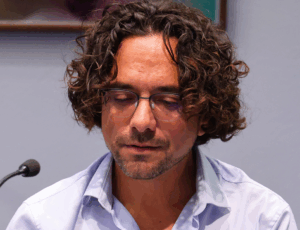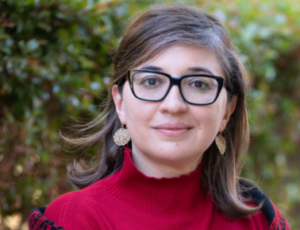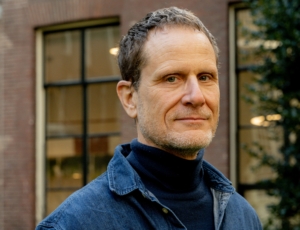
Moving Beyond Welfare Chauvinism
Interview with Verena Seibel by Merlijn Olnon
What is your research project at NIAS?
My NIAS project focuses on migrants’ perceptions of the welfare state they live in, and the knowledge they have about the organization of certain welfare resources, eligibility criteria and access possibilities. I call this ‘system knowledge’. My previous research shows that migrants have much less system knowledge than non-migrants. At NIAS, I am investigating how we can explain this variation in system knowledge on the one hand and how such lack of knowledge can have consequences for migrants’ access to welfare resources, but also transnational behavior.
I am currently working on a paper that examines the relationship between migrants’ understanding of the Dutch healthcare system and cross-border healthcare use. My findings suggest that the less informed migrants are about how the Dutch healthcare system, the more likely they are to seek healthcare outside the Netherlands. In another paper, I look at highly skilled migrants’ experiences and perceptions of social services and benefits in the Netherlands and how this affects their intentions to stay in the Netherlands. Again, we see that knowledge of social rights matters. Highly skilled migrants who are well informed about their access to welfare resources are much more likely to intend to stay in the Netherlands for a longer period. This suggests that migrants’ perception of social security also matters for return migration.
How does this work fit into your broader research agenda?
I am interested in migrants’ perspectives on integration. How do migrants navigate the welfare state and other institutions that are crucial for their well-being? In addition to studying typical dimensions of integration, such as labor market integration or social integration, I have also examined migrants’ knowledge of their social rights. Social rights refer to the rights provided by social policies that aim to reduce inequalities within society and are a key policy instrument to contribute to people’s social security. Social rights include access to health care and childcare, but also public pensions and unemployment benefits.
My research shows that migrants are less informed about their social rights than non-migrants. This is problematic because lack of knowledge is a key barrier to migrants’ access to social services and benefits and may explain why migrants are less likely to use social services and benefits than non-migrants. We also see that the knowledge gap is between first generation migrants and the native born. Second-generation migrants who grew up in the Netherlands are much better informed than their parents about how to access welfare resources.
I have been able to show that these knowledge gaps are not only greatest among first-generation migrants, but also among migrants with lower levels of education and migrants who do not speak the language of the country of residence well. This is not particularly surprising, but it does highlight a major challenge for the welfare state. It is precisely these migrant groups that are most in need of welfare support, but least informed about their social rights. We should therefore ask ourselves whether the welfare state is able to reach the most vulnerable groups for whom many social policies have been designed.
What is your methodology?
I was trained as a quantitative sociologist and as such I am interested in patterns within society. I work with survey data, which means that I collect information about a large representative group of interest (e.g., people with an immigrant background living in the Netherlands) and then analyze this data with various regression models. Over time, I have also moved to other quantitative methods, such as vignette studies, where I present people with short, detailed descriptions of hypothetical situations (so-called vignettes) and analyze whether the respondent’s answer to a specific question changes when the hypothetical situation changes. In my most recent projects, I will be collecting ego-centric network data, where I will ask a large number of people (from migrant backgrounds) to select twenty people in their network and provide further information on network members I am interested in. This could be gender, educational background, or ethnicity, but also whether respondents have received support from these network members in particular situations.
Recently, I have also been involved in qualitative research projects that have broadened my academic horizons. Commissioned by the Ministry of Social Affairs and Employment, some ERCOMER colleagues and Regioplan are conducting semi-structured interviews and focus groups to better understand Muslim experiences of discrimination in different domains (e.g., labor market, health care) over the life course. My PhD student Sara Marcora is also preparing fieldwork for 2025, where she will conduct semi-structured interviews with older migrants living in the Netherlands to understand how they are preparing for retirement.
Why have you chosen this topic?
I have always been interested in the perspective of minority groups and how they behave, feel, and think in a society not designed for them. I have lived a transnational life for the last twenty years and have many friends and family members with a migrant background. So, I am familiar with some of the challenges, but also the opportunities, that migration can bring.
In my research, I study documented migrants with a residence permit, who currently make up 85% of migrants entering the Netherlands, and include migrants who come on work visas, family visas or migrants who benefit from free mobility, such as EU migrants. In relation to my research on welfare perceptions and knowledge, this group fascinates me because legally, they are granted almost the same social rights as non-migrants, but they have much more difficulties in realizing their social rights.
What has been your own trajectory?
I am originally from Germany and started my academic career as a bachelor student in Sociology at the University of Mannheim. During my bachelors, I went to Groningen University on an Erasmus exchange and was amazed by the high quality of teaching at Dutch universities. This was also why I went to Utrecht University for my Master’s, where I completed the Research Master’s in Sociology and Social Research (2011). In Utrecht, I became interested in migration and integration. I developed a research proposal on the over-education of migrants in the labor market and was accepted as a PhD student at the Berlin Graduate School of Social Sciences, Humboldt University, where I graduated in 2015. I was then offered a post-doctoral position at the University of Konstanz by Claudia Diehl at the Department of Microsociology. During my time in Konstanz, I was part of an international research team that collected data on over 10,000 migrants living in Germany, the Netherlands and Denmark, focusing on migrants’ attitudes towards the welfare state.
Given the precarious situation in the German academic labor market, I next decided to cast a wider net and applied for an assistant professorship at the Department of Sociology at the University of Groningen, where I relocated with my family in 2018. In Groningen, I was introduced to quantitative social network analysis, a way of understanding how people, groups or even organizations are connected, interact, and influence each other. My two latest grants are on the role of migrants’ social networks and were inspired by my time there. In 2021, I accepted a position as Assistant Professor at Utrecht University, where I work at the Department of Interdisciplinary Social Sciences and am a member of the European Research Centre on Migration and Ethnic Relations (ERCOMER).
What might a broader, comparative perspective suggest?
In some of my work I have compared migrants living in Germany, the Netherlands and Denmark. These three countries have differing welfare regimes: Germany a Christian Democratic, Denmark a social democratic, and the Netherlands a hybrid, more liberal form. We see that for migrants, the consequences of their knowledge of the system vary between these countries. But the differences between distinct groups of migrants are even stronger and more persistent.
My research and that of colleagues suggests that the welfare socialization that migrants experience in their country of origin strongly influences their perceptions and knowledge of the welfare state in the host country. We also see that the longer migrants live in the host country, the more their perceptions become like those of the non-migrant population. This also suggests that migrants, through socialization, adapt to the attitudes of the host country over time.
What do you envision moving or expanding into next?
In the coming years, I want to explore the role of social networks much more deeply. My research shows that migrants get a lot of information about their social rights from their peers. However, we know little about which types of social networks are most useful and why. I want to explore this further using a mixed methods approach.
What concerns and desires drive your research?
I am concerned about the current political climate, which is fueling anti-migrant attitudes and portraying migrants as a burden on tax authorities and the welfare state. I find this problematic because, as my colleague Gianna Eick of the UvA recently stated in her interview with NLTimes and of course in her recent book on so-called welfare chauvinism, ‘the politics are not in line with the facts’. This is a genuine problem. Not only because it drives a wedge between native Dutch and migrants, but also because we need politicians to be truthful. One of my aims is to provide the public with concrete information about the migrant perspective on the welfare state, and to counter some of the many myths about their access to welfare resources with simple but robust facts. (I would like to add that I am certainly not a front-runner in this respect: my academic socialization was in Germany, where outreach and impact is much less prioritized than in the Netherlands, but I am striving and have some inspiring colleagues in this regard.)
In the current political climate, migrants are often perceived as welfare recipients who come to the Netherlands to take advantage of welfare resources. But there is simply no evidence to support these assumptions. The biggest driver of migration remains economic migration due to labor shortages in the Dutch labor market, as Hein de Haas explains so well in his book on drivers of migration. My own research shows that migrants are surprisingly uninformed about their social rights and how to access benefits and services. In one of the projects, where I was a post-doc (in migrants’ welfare state attitudes), we looked at migrants’ knowledge about accessing welfare. Over 60% of migrants underestimate their right to access social assistance, meaning that they think the rules are much stricter than they are. The same applies to other areas of welfare: migrants are much less informed than the Dutch about the eligibility criteria for childcare benefits or about cancer prevention programs. The narrative of the rational, calculating migrant who comes to the Netherlands only to exploit Dutch resources is not supported by the research.
How do you square all this with what the CBS reports on Welfare dependency: ‘Met name migranten uit Marokko en overig Buiten-Europese landen ontvingen vaak bijstand: 20,4 en 17,7 procent. Dat is ruim vier keer zo vaak als gemiddeld. Het aandeel Surinaamse, Turkse en Nederlands-Caribische migranten met bijstand is wat kleiner, maar wel 2 tot 3 keer zo groot als gemiddeld.’
To me, those are not surprising findings: the CBS looks at the total population of Dutch natives and various migrant groups. Since migrants from these countries are on average less well educated and therefore face a higher risk of unemployment than Dutch natives. As a result, a higher proportion of migrants need social assistance than the native Dutch. However, and this is where it gets interesting, if we only look at those who are eligible for social assistance and compare natives with migrants, we know from international studies that migrants are more likely not to use social assistance than natives. So, it really matters which groups we are comparing.
There are many reasons for this ‘non-take-up’ by migrants, ranging from lack of knowledge to lack of trust and fear of stigma or negative consequences for their visa. The problem, then, is twofold: if we want to reduce the risk of social assistance dependency among the migrant population, as the CBS data show, the Dutch government must invest in the education of these groups and reduce discrimination against foreigners in the labor market. However, if we look at those who are eligible for social assistance and are therefore already in a very vulnerable position, we should be interested in enabling migrants to access social assistance for the simple reason that it is crucial for their social security. And social security is crucial for our social cohesion.
It seems to me that people often underestimate the impact that poverty has not only on the individual, but also on our society. Poverty makes people vulnerable to all sorts of risks, such as poorer health, negative peer influences, etc. And the ‘price’ is paid by society, for example through increased health care costs. We should therefore all have a strong interest in contributing to a good standard of living for everyone, including migrants, to reduce the risk of needing social assistance.
Why do you think the CBS takes this approach?
The aim of the CBS is to publish data on the Dutch population, economy, and society to inform policymakers and researchers, as well as the public, about current developments. The data mentioned above can be read from different perspectives and is contingent on, among other things, your general view of society. People who tend to lean to the right may interpret these figures in a way that portrays migrants as exploiting the Dutch welfare state, thus feeding a welfare chauvinist narrative. One political consequence could be to restrict access to social assistance for certain groups. Or you can interpret these figures from a more inclusive perspective, arguing that these figures show that certain migrant groups are still economically marginalized. In this case, a policy consequence would be to strengthen the position of migrant groups in the labor market.
I believe it is our duty as researchers to dig deeper into the data and explore the realities and assumptions behind them. For example, how do we measure the cost of welfare? Is it just money provided by the government? Or does it also include informal labor provided by minorities? The answers to such questions have profound consequences for the interpretation of these ‘raw’ statistics. And, as I said, if we compare those who are eligible for social assistance, are people from a migrant background more likely to take up this government financial support? Research suggests that this is not the case. The CBS provides the perfect platform to stimulate such research questions.
In the end, for someone doing quantitative research, you are concerned a lot with (migrant) experiences and seem to be looking for qualitative (policy) impact. Do you feel you are edging towards a more mixed methodological approach?
Surely. As I said above, I have now started two projects using a qualitative approach. I have always found it difficult when researchers claim that their method is the true method. Every method has its strengths and weaknesses, and it really depends on the research question which one is best suited. Of course, there is variation in the quality of methods. But this variation, in my view, is more within each methodological discipline than between methodological disciplines. There is excellent quantitative research and there is lousy quantitative research. The same goes for qualitative methods. You can be an excellent anthropologist or not. We should strive for methodological excellence within each methodological discipline and, at best, learn from each other.
Are you hopeful about the political and societal impact of your research?
It is my conviction that researchers should aim to inform society, policymakers, and stakeholders, especially at a time when mistrust and misinformation dominate the public debate. And indeed, I hope that through my research I will be able to develop policy interventions that a) help to provide migrant populations with crucial information about their social rights, and b) inform the general population about the reality of migrants living in the Netherlands, which is very different from what the media and politicians make it out to be. I remain hopeful about this potential for impact, as I have personally experienced that political institutions, such as ministries, do have a genuine interest in our research.
To send us of, could you suggest two further books that you have found inspiring?
Caroline Criado Perez’s book Invisible Women very much inspired me. It has little to nothing to do with my own research topic but does demonstrate the relevance and power of data and the potentially severe consequences of not collecting data on marginalized groups. In terms of my own research, I very much look up to Diana Sainsbury, whose seminal Welfare States and Immigrant Rights: The Politics of Exclusion and Inclusion has influenced my field by taking migrants into account when studying social rights.
This essay was edited and published in co-operation with the Dutch Review of Books. For the Dutch version, see here.



